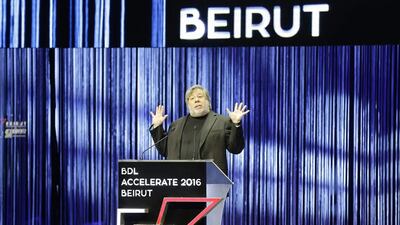omeone, I forget who, once told me “everything before the ‘but’ is meaningless”. Here’s the “before” bit. In the same week that Lebanon ended its two year political impasse by nominating Michel Aoun, an 81-year-old former army commander, as president and appointing Saad Hariri, the Saudi-born billionaire businessman as the next prime minister, it welcomed two Apple legends, Steve Wozniak, co-founder of the US$250 billion tech company, and Tony Fadel, an American-Lebanese whizz-kid who essentially invented the iPod.
Mr Wozniak and Mr Fadel headlined the Lebanese Central Bank’s “Accelerate” conference, billed, rather optimistically, as the biggest tech gathering in the Mediterranean and themed under the strapline Innovation: Intrapreneurship v Entrepreneurship. (If, like me, you are wondering what “intrapreneurship” is, Wikipedia defines it as “the act of behaving like an entrepreneur while working within a large organisation”, which sounds like every Lebanese public sector worker.)
So the conference was held in a mood of optimism not felt in the country since the ill-fated Bashir Gemayel was elected president in 1982. Which was probably just as well. “Accelerate” would have been planned at least a year ago if the conference organisers had to book such stellar names, and it would have taken some of the shine off the three days had the event tried to sell the dynamism of a country that after two years, still couldn’t nominate a president.
As it was, Messrs Wozniak and Fadel inspired everyone, delivering their “nothing is impossible if you believe it can happen” shtick and it all fitted in with the bullish mood.
And yes, Lebanon has a massive pool of talent that is aching to make its mark in a vibrant and fast-paced global industry, but – and here is the “but” that negates everything that has gone before – the reality is that Lebanon is still poorly placed to milk this talent, because the state and its buddies in the banking sector have consistently failed to create a genuine business friendly environment. It is a situation that doesn’t look like changing any time soon, even though Mr Aoun is seen as the nation’s saviour.
Diplomats who visited Baabda Palace to congratulate Mr Aoun on his victory have said that as well as rooting out corruption and strengthening the state institutions, he wants to fix the economy, but when asked politely just how he was going to do the latter, the new head of state was apparently unable to build on his initial soundbite.
To be fair, few Lebanese leaders have done better, but to those Lebanon watchers who like me are naive enough to still believe in details and concrete pledges, the feeling is that once the celebrations are over, nothing much will change. Sure, the real estate market might pick up and some of the Arab tourists may return, but unless there is a seismic shift in how the government works, sectors such as Lebanon’s nascent tech efforts are unlikely to take off.
But – and here’s a second “but” – if, as some of the more optimistic businessmen have pointed out, Mr Aoun, who is admittedly the first head of state since president Gemayel to control a sizeable parliamentary bloc (he is the founder and former leader of the Free Patriotic Movement) and prime minister Hariri really can put aside their decade-long differences and work together, then there is every chance that a strategy to revive the moribund economy may just materialise.
This is because Mr Aoun’s supporters are mainly middle- class professionals who have loyally supported the obstinate and often unpredictable former army commander, even when he signed his infamous “understanding” with Hizbollah in 2006. They will expect his technocrat ministers to deliver the goods.
In the same vein, Mr Hariri, the son of the late former prime minister Rafik Hariri, is trying to win back lost support within Lebanon’s Sunni merchant class and his Future Movement has put prosperity as a priority ever since it emerged as one of the triumphant forces that led the 2005 Cedar Revolution.
Back at the conference, the mood was about talent and potential. Mr Fadel was convinced Lebanon is a thriving incubator for tech companies, declaring that he was in Lebanon “to find great start-ups to help because I can see that there are some good companies and talent here”.
Of that there is no doubt.
Michael Karam is a freelance writer who lives between Beirut and Brighton
business@thenational.ae
Follow The National's Business section on Twitter

